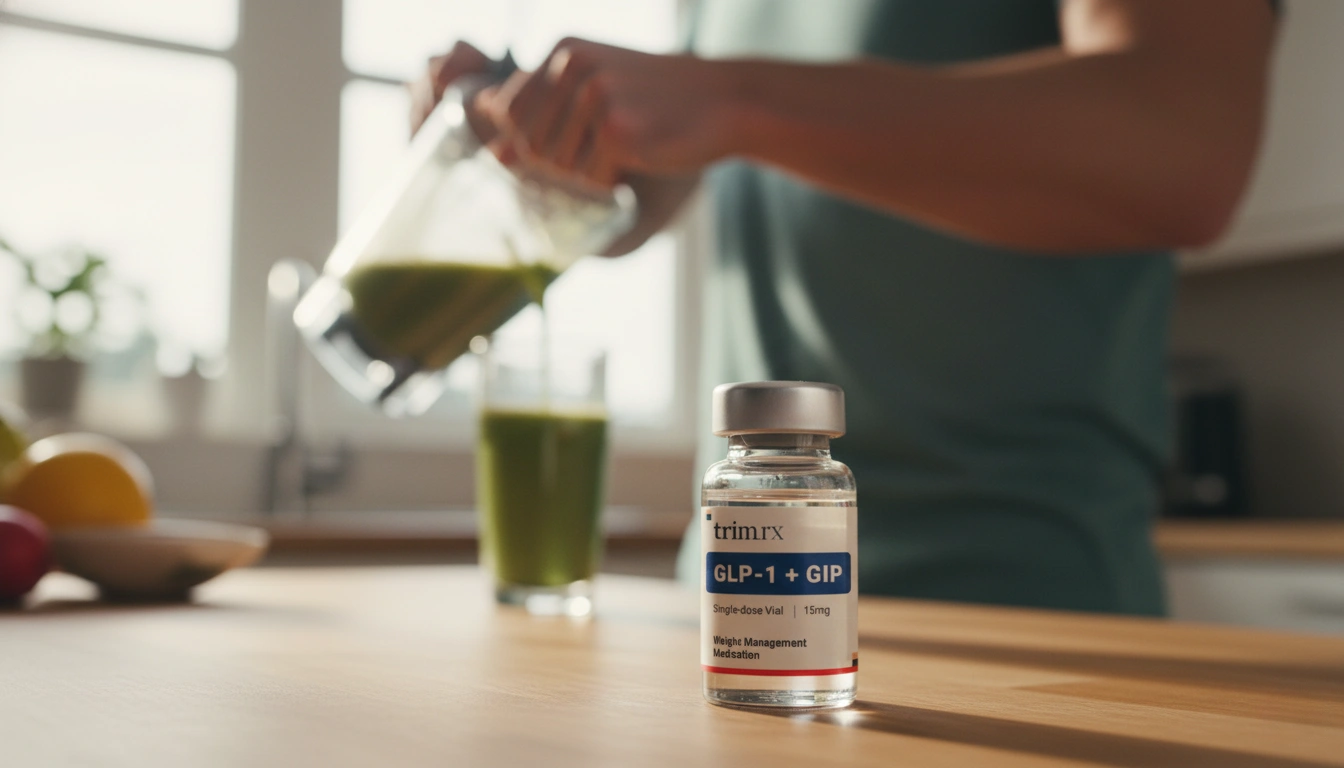Why GLP-1 Causes Weight Loss: Insights into Mechanisms and Benefits

Introduction
Did you know that nearly 42% of adults in the United States are classified as obese? This staggering statistic highlights a growing public health crisis, one that is intimately linked to conditions such as type 2 diabetes, heart disease, and certain types of cancer. While lifestyle changes like diet and exercise are crucial for weight management, many individuals find it challenging to achieve and maintain sustainable weight loss. This is where glucagon-like peptide-1 (GLP-1) receptor agonists come into play, a class of medications that has garnered attention for their remarkable effects on weight loss.
At TrimRx, our mission is to empower individuals on their weight loss journeys through personalized, medically supervised care. We believe that sustainable weight loss should be achieved through science, empathy, and a transparent approach. In this blog, we will delve into the mechanisms of GLP-1 and explore why it causes weight loss, the medications available, and how they can be integrated into a holistic weight management strategy.
By the end of this article, you will gain a comprehensive understanding of GLP-1, its effects on appetite and metabolism, and how TrimRx can support your weight loss goals with our tailored programs.
Understanding GLP-1: The Mechanism Behind Weight Loss
GLP-1 is a hormone that is produced in the intestines and plays a critical role in glucose metabolism and appetite regulation. When we consume food, GLP-1 is released, acting on various organs and pathways throughout the body to exert its effects. Here are the key mechanisms through which GLP-1 contributes to weight loss:
Appetite Regulation
One of the primary functions of GLP-1 is to regulate appetite. It signals to the brain that the body has received enough food, which helps reduce hunger and food intake. Research has shown that GLP-1 receptor agonists can enhance feelings of fullness (satiety) and decrease cravings, leading to a reduction in overall caloric consumption.
Example: Studies have indicated that individuals using GLP-1 receptor agonists experience a significant decrease in their desire to consume high-calorie foods, particularly those that are high in fat.
Delayed Gastric Emptying
GLP-1 also slows gastric emptying, which means that food remains in the stomach for a longer period of time. This delay not only prolongs the feeling of fullness after meals, but it also helps to stabilize blood sugar levels by preventing rapid spikes.
Example: Research has shown that delayed gastric emptying correlates with increased satiety, allowing individuals to consume fewer calories over time without feeling deprived.
Increased Insulin Secretion
In individuals with type 2 diabetes or those at risk, GLP-1 enhances insulin secretion in response to meals. This is crucial for managing blood sugar levels and preventing the adverse effects of hyperglycemia. By improving insulin sensitivity and lowering blood glucose levels, GLP-1 receptor agonists can facilitate a healthier metabolic state that supports weight loss.
Example: Clinical studies indicate that patients on GLP-1 receptor agonists not only achieve better glycemic control but also experience significant weight loss compared to those not on these medications.
Reduced Glucagon Secretion
Glucagon is another hormone produced by the pancreas that raises blood sugar levels. GLP-1 receptor agonists suppress glucagon secretion, which further aids in controlling blood sugar levels and reduces the likelihood of hunger.
Example: By lowering glucagon levels, GLP-1 receptor agonists create a more favorable hormonal environment for weight management.
The Role of GLP-1 Receptor Agonists in Weight Loss
Now that we understand how GLP-1 works, let’s explore the different GLP-1 receptor agonists available on the market and their significance in weight loss.
FDA-Approved GLP-1 Medications
Several GLP-1 receptor agonists are currently FDA-approved for the treatment of type 2 diabetes and obesity. These include:
- Semaglutide (Ozempic®, Wegovy®): Administered via weekly injections, semaglutide has shown significant results in weight loss, with studies indicating an average reduction of up to 15% of body weight in individuals using it.
- Liraglutide (Victoza, Saxenda): Available in both diabetes and weight management formulations, liraglutide is administered daily and has been effective in promoting weight loss alongside lifestyle modifications.
- Tirzepatide (Mounjaro®, Zepbound®): This newer medication combines GLP-1 and GIP (Gastric Inhibitory Polypeptide) effects, leading to enhanced weight loss and metabolic control.
How TrimRx Utilizes GLP-1 Medications
At TrimRx, we recognize that everyone’s weight loss journey is unique. Our personalized weight loss program includes a free assessment quiz to help determine eligibility for these GLP-1 medications. By understanding your individual needs and goals, we can create a tailored treatment plan that incorporates these innovative medications, supported by regular consultations, medication management, and ongoing support.
Take our free assessment quiz to see if you qualify for our prescription weight loss medications: TrimRx Free Assessment Quiz.
The Importance of a Holistic Approach to Weight Management
While GLP-1 medications are powerful tools in the fight against obesity, they should not be viewed as standalone solutions. A holistic approach to weight management is essential for long-term success. Here are some key elements that should accompany the use of GLP-1 medications:
Nutritional Guidance
Nutrition plays a vital role in weight loss. Our team at TrimRx emphasizes the importance of a balanced diet that fosters sustainable eating habits. We provide resources and support to help individuals make informed food choices, focusing on whole foods, appropriate portion sizes, and mindful eating techniques.
Physical Activity
Incorporating regular physical activity is another crucial aspect of weight management. Exercise not only helps burn calories but also promotes overall health and well-being. We encourage our clients to find enjoyable activities that fit their lifestyles, whether it’s walking, cycling, or group fitness classes.
Behavioral Support
Behavioral changes are often necessary to achieve lasting weight loss. Our empathetic team offers support and guidance to help individuals overcome psychological barriers, adopt healthier habits, and develop resilience throughout their weight loss journeys.
Continuous Monitoring and Adjustments
Weight management is a dynamic process that requires ongoing monitoring and adjustments. At TrimRx, we provide regular check-ins to evaluate progress, address challenges, and modify treatment plans as needed. Our goal is to ensure that individuals feel supported and motivated throughout their journey.
Real-World Impact of GLP-1 Medications
Clinical studies have demonstrated the efficacy of GLP-1 receptor agonists in promoting weight loss and improving metabolic health. Here are some noteworthy findings:
- Semaglutide: In a pivotal study, participants taking semaglutide lost an average of 15% of their body weight after 68 weeks, showcasing its potential as a transformative weight loss solution.
- Liraglutide: Research indicates that patients using liraglutide achieved greater weight reduction compared to those on placebo, with many maintaining their weight loss over extended periods.
These findings emphasize the role of GLP-1 medications as effective adjuncts to lifestyle changes, contributing to significant and sustainable weight loss.
Conclusion
GLP-1 receptor agonists represent a groundbreaking advancement in the management of obesity and type 2 diabetes. Through their multifaceted mechanisms—such as appetite regulation, delayed gastric emptying, and improved insulin sensitivity—these medications have proven to be effective tools for weight loss.
At TrimRx, we are committed to providing personalized, medically supervised weight loss solutions that integrate the latest advancements in pharmacotherapy with holistic lifestyle changes. By focusing on the unique needs of each individual, we can work together to achieve sustainable weight loss and improve overall health.
If you’re ready to take the first step on your weight loss journey, we encourage you to take our free assessment quiz to determine your eligibility for GLP-1 medications: TrimRx Free Assessment Quiz.
FAQ
What are GLP-1 receptor agonists, and how do they help with weight loss?
GLP-1 receptor agonists are medications that mimic the action of the naturally occurring hormone GLP-1. They help regulate appetite, slow gastric emptying, and increase insulin secretion, leading to reduced food intake and weight loss.
Who can benefit from GLP-1 medications?
Individuals with obesity or overweight, particularly those with type 2 diabetes or related health conditions, may benefit from GLP-1 medications. A free assessment quiz can help determine eligibility.
Are there any side effects associated with GLP-1 medications?
Common side effects include nausea, vomiting, and gastrointestinal discomfort, which often improve over time. It’s important to discuss potential side effects with a healthcare provider.
How long do I need to take GLP-1 medications?
The duration of treatment depends on individual goals and responses. Some individuals may benefit from long-term use to maintain weight loss and improve metabolic health.
Can I achieve weight loss without medication?
Yes, weight loss can be achieved through lifestyle changes, including diet and exercise. However, GLP-1 medications can enhance and support these efforts, especially for those struggling to lose weight.

Transforming Lives, One Step at a Time
Keep reading
Vitamin B12 and GLP-1 Medications: What to Know
GLP-1 medications can lower B12 absorption and intake; learn symptoms, food sources, supplement options, and how to monitor levels.
Semaglutide Injection Site Reactions: What To Know
Learn why semaglutide injections can cause redness, swelling or nodules, how to prevent and treat them, and when to seek medical care.
TrimRx vs Friday’s
Compare TrimRx and Friday’s telehealth GLP-1 weight-loss programs: pricing, medical support, coaching, delivery, and which fits your needs.



